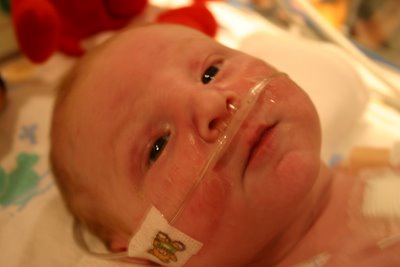
Errol, or "the little man" as we are calling him, is in the PICU (Pediatric Intensive Care Unit) on the eighth day of his life, three days out of his first open heart surgery. You can see he's still got his nasal canula (nose oxygen tube), but his eyes are shining, the blood is already starting to circulate better, and his complexion is getting rosy. The operation has put a gleam in his eyes, but it is also companion to a wistfulness and sadness that he should be too young to know. Of course Errol is grateful just to be alive (he's already been through more of a fight than most people ever go through), but he also wants more of life.
At one week, Errol has already learned a lesson we've tried hard (and mostly successfully) to keep our three year old from learning; life can be rough. Errol will be (and there's good and bad in this) tougher than the rest of us. We mourn the innocence he lost at the moment of his birth, but we are all grateful for his life.
As soon as his operation is over we begin to pester the doctors and nurses to get the tubes out. Usually they take Errol's breathing tube out pretty fast. Then we begin to ask about the catheter. Within a few days, the chest drainage tube goes, and then we work on the IVs (he sometimes has three or four), until finally we are just down to the pulse and oxygen monitors. We don't want to rush things beyond safety, but we know that the less he looks like a robot, the closer he is to health.



